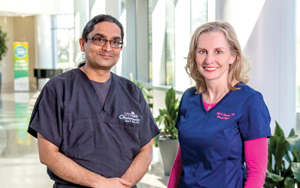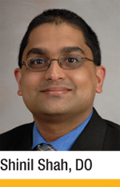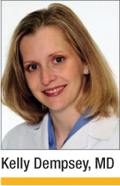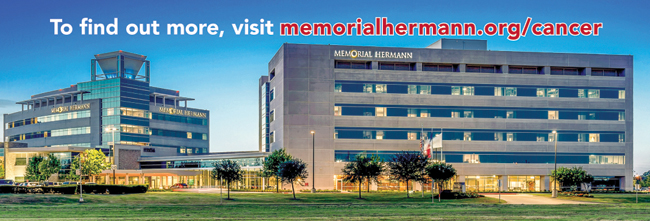Posted on Mar 30, 2022 in
COVER STORY
COVER STORY | Photos by Kelley Sweet Photography

Shinil Shah, DO and Kellt Dempsey, MD.
People with cancer living in Fort Bend now have an ally that’s been providing patient care since 2006. Seven years in the planning, Memorial Hermann Sugar Land Hospital has launched an integrated multidisciplinary program that brings together specialists from within the Memorial Hermann network and integral partners from the community to offer a seamless approach to cancer care.
“We’ve brought together a collaboration of specialists in cancer prevention, diagnosis and treatment to best serve the people of Sugar Land and Fort Bend County,” said Shinil Shah, DO, a board-certified general surgeon and associate professor of surgery at McGovern Medical School at UTHealth Houston who is affiliated with Memorial Hermann. “We understand the importance of having high-quality, comprehensive cancer care close to home and have worked tirelessly to ensure we’re bringing that to the people of this community.”
Dr. Shah, who has been instrumental in setting up this program, says that patients benefit from having a diverse range of cancer specialists working together. He points to twice-monthly Tumor Boards, or Cancer Conferences, held at Memorial Hermann Sugar Land, where physicians from various specialties meet to review patients’ diagnostic tests, tumor types, personal and family histories, as well as the latest evidence-based treatments and clinical trials available.
CANCER SCREENING RECOMMENDATIONS
Breast Cancer
• Women ages 40 to 44 should have the choice to start annual mammograms.
• Women ages 45 to 54 should get mammograms yearly.
• Women 55 and older should switch to mammograms every 2 years or continue yearly.
Colon and Rectal Cancer
• For those at average risk, regular screenings are recommended at age 45.
• If you’re in good health, you should continue regular screening through age 75.
Cervical Cancer
• Women between the ages of 25 and 65 should get a primary HPV (human papillomavirus) test done every 5 years, or a co-test (an HPV test with a Pap test) every 5 years or a Pap test every 3 years.
• Women over age 65 who have had normal results from cervical cancer tests in the past 10 years should not be tested for cervical cancer. Those with a history of a serious cervical pre-cancer should continue to be tested for at least 25 years after that diagnosis, even if testing goes past age 65.
Lung Cancer
Yearly lung cancer screening with LDCT scans are recommended for people who:
• Are 50 to 80 years old and in fairly good health, and
• Currently smoke or have quit in the past 15 years, and • Have at least a 20 pack-year smoking history.
Prostate Cancer
• At 50, men should talk to a healthcare provider to decide if testing is the right choice.
• If you are African American or have a father or brother who had prostate cancer before age 65, you should have this talk with your provider starting at age 45.
Take control of your health and help reduce your cancer risk
• Avoid all forms of tobacco.
• Get to and stay at a healthy weight.
• Get moving with regular physical activity.
• Eat healthy with plenty of fruits and vegetables.
• Limit alcohol use to 1 drink per day for women or 2 per day for men.
• Protect your skin from the sun.
• Know yourself, your family history and your risks.
• Get regular checkups and cancer screenings.
Source: American Cancer Society Guidelines for the Early Detection of Cancer.
“Our Tumor Boards are comprised of a wide range of specialists from the fields of gastroenterology, urology, pulmonary diseases, medical and radiation oncology, pathology, diagnostic and interventional radiology, and surgery,” he said. “That’s important because cancer treatment doesn’t just involve one specialty or modality.”

Also present during the Tumor Boards are Oncology Nurse Navigators. These experienced oncology nurses work directly with cancer patients and their families to guide them through the process as the point of contact, coordinating communication within the care team, helping patients connect with care options and educating them along the way. Nurse Navigators are a complimentary service offered by Memorial Hermann.
“We’re harnessing the power of all of these specialties to arrive at the best treatment options for each patient,” Dr. Shah said. “We look at the type of treatment, the timing of that treatment, and the availability of clinical trials and novel treatments. All of our treatment decisions are made in collaboration with our patients, based on research and the latest evidence-based guidance from trusted medical societies and professional associations.”
 Similarly, Memorial Hermann Sugar Land has established a robust screening program to detect cancer at its earliest, most treatable stages. Kelly Dempsey, MD, a breast surgeon affiliated with Memorial Hermann, has been a staunch advocate to improve patient compliance with screening recommendations. “Just like with breast cancer, catching all types of cancer at their earliest stages can be the key to successful treatment and survivability,” Dr. Dempsey said.
Similarly, Memorial Hermann Sugar Land has established a robust screening program to detect cancer at its earliest, most treatable stages. Kelly Dempsey, MD, a breast surgeon affiliated with Memorial Hermann, has been a staunch advocate to improve patient compliance with screening recommendations. “Just like with breast cancer, catching all types of cancer at their earliest stages can be the key to successful treatment and survivability,” Dr. Dempsey said.
Dr. Dempsey led efforts at Memorial Hermann Sugar Land to bring tomosynthesis, or 3-D breast imaging, to the hospital over a decade ago. Now, all Memorial Hermann facilities offer 3-D mammography as a standard of care. According to Dr. Dempsey, this is helping to decrease the number of people who receive callbacks for findings on a traditional 2-D mammogram that were often found to be benign. Furthermore, 3-D mammograms provide more detailed imaging that is helping to detect breast cancer at an earlier, more treatable stage.
“We have a better understanding of how important cancer screenings are to treating cancer,” she said. “And monthly Tumor Board meetings help the physicians involved in all aspects of cancer care fully grasp the value of these screenings, so we each can encourage patients to get the screenings they need to stay healthy.”
Dr. Dempsey, who also sees patients as part of Memorial Hermann’s high-risk screening program for breast cancer, and her colleagues talk to their patients about following screening guidelines for colonoscopy, cervical cancer screening and annual well-woman exams, lung cancer screenings, prostate cancer screenings and annual full-body exams to detect skin cancer.
They also stress with their patients the importance of having a primary care physician, who can help facilitate the screenings with referrals and orders. Simultaneously, they are working to remove barriers that prevent some people from following recommended screening schedules. Dr. Shah points to open-access colon cancer screenings as an example. This Memorial Hermann service allows patients 45 and older to schedule their colonoscopy directly with a facility and get help finding a gastroenterologist.
“The goal of the integrated multidisciplinary approach to cancer that we have established at Memorial Hermann Sugar Land is better outcomes for patients,” Dr. Shah said. “They get plugged into a wide network of specialists from throughout the entire Memorial Hermann Health System and the Greater Houston area.”
“When I look at the quality of the care team represented in our Tumor Board meetings, I know I can confidently refer patients to any one of these experienced physicians,” Dr. Dempsey said. “Patients really benefit from this type of collaboration and our collective belief that patients come first.”

Memorial Hermann Sugar Land Hospital


 <
<








 Similarly, Memorial Hermann Sugar Land has established a robust screening program to detect cancer at its earliest, most treatable stages. Kelly Dempsey, MD, a breast surgeon affiliated with Memorial Hermann, has been a staunch advocate to improve patient compliance with screening recommendations. “Just like with breast cancer, catching all types of cancer at their earliest stages can be the key to successful treatment and survivability,” Dr. Dempsey said.
Similarly, Memorial Hermann Sugar Land has established a robust screening program to detect cancer at its earliest, most treatable stages. Kelly Dempsey, MD, a breast surgeon affiliated with Memorial Hermann, has been a staunch advocate to improve patient compliance with screening recommendations. “Just like with breast cancer, catching all types of cancer at their earliest stages can be the key to successful treatment and survivability,” Dr. Dempsey said.